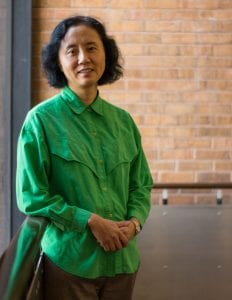Math Lecturer Finds Joy In Mentoring Middle School Students

The College of Sciences recently sat down with Michelle Kwon, Ph.D., to talk about her work as a mathematics professor and leader of Math Circle.
(Some answers edited for clarity and brevity.)
COS: What’s the purpose of Math Circle, in your own words?
Kwon: The purpose of Math Circle is to make middle school students love mathematics even more by expanding their experiences with other students who are curious about mathematics.
We also hope some of the participants become mathematicians or educators who enrich their lives by sharing their passion and joy of mathematics with younger generations in future.
COS: What is your role within Math Circle?
Kwon: I plan, manage and coordinate all components of Math Circle in spring, from advertisement, inviting faculty members for the enrichment talks, establishing the programs for the problem-solving sessions, mentoring the session leaders and communicating with parents and educators.
COS: Describe the students who come to Math Circle.
Kwon: Most of our students consist of middle school aged students who are curious about mathematics and want to expand their experiences in mathematics beyond what they learn from school.
COS: What does a typical Math Circle session look like?
Kwon: The first half of the session is faculty member’s enrichment talk with intriguing topics in mathematics for all participants.After that, students are divided into three groups; Grade 6, Grades 7 and 8 and Advanced group.
They follow their teachers to different classrooms and engage in problem-solving and discussion activities.
COS: How do you apply your experience as an educator to Math Circle?
Kwon: Field experiences in middle schools in Canada helped me to develop the programs, which are well-aligned with the middle school curriculum. Active learning strategies used in some middle schools are adopted in the second half of the session. Our sessions encourage students to present their own understanding with the subjects and participate in discussion with problem solving with solvable but somewhat challenging problems. Even though session leaders review the curriculum materials learned at school or teach enrichment materials as a preparation for problem-solving activities, their primary role is facilitators of learning who help students develop higher-level thinking skills through problem solving and discussion.
COS: What are some of your favorite experiences from math circle?
Kwon: Last year, the advanced group learned how to prove the familiar facts in geometry and number theory. Students were not familiar with abstract reasoning. They seemed to struggle. After a while, in the faculty member’s enrichment talk, a new pattern of questions emerged from the advanced group. They asked how to prove the statements the speaker was using. I saw the changes in what students became interested in and how to understand (the subject).
We are happy when we hear students had good experiences in our Math Circle. Here is feedback from one of the parents last year:
“I wanted to thank you. Our niece from New York got to be part of Saturday’s Math Circle in the 7th/8th Grade group. Her feedback was that in her New York school the teachers go so fast. But she said the UCF Math Circle was a different experience. She said, “I never have a chance to dig deeper in class. I love how it took me almost 40 minutes to figure out complex problems because it made me think, and think and think about a solution in so many ways. It was the best! I love math again!”
